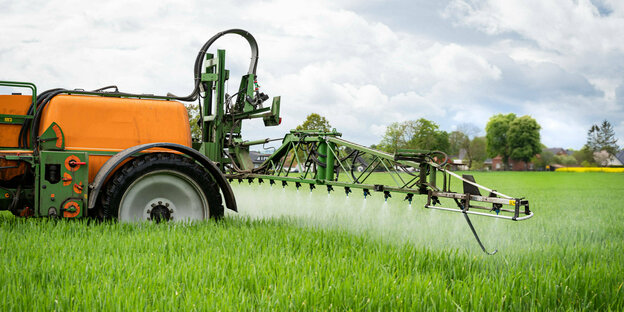Agriculture Minister Özdemir wants less poison in the fields. Environmental associations consider the measures too vague. The farmers are not happy either.
A farmer sprays his crops with a field sprayer against spot disease and stem breakage Photo: imago
Berlin fresh | In an open letter to Agriculture Minister Cem Özdemir, environmental associations are calling for concrete measures to reduce the use of pesticides in agriculture. They criticize the discussion paper ‘Plant Protection Future Programme’, which was previously called ‘Pesticide Reduction Programme’. With this the Ministry of Agriculture wants to involve various agencies in the reduction of pesticides. Environmental and farming associations had until May 3 to submit statements on paper.
Environmental groups support the Agriculture Department’s targets set out in it to halve pesticide use by 2030. However, there is a lack of “binding, achievable and measurable measures”. The 14 associations that signed the open letter include BUND, Nabu and organic farming association Demeter.
“The use of pesticides has been very high for years and the disappearance of species in the agricultural landscape continues,” emphasizes Olaf Bandt, President of BUND. With the current discussion paper, species protection is becoming more remote. The German Nature Conservation Ring, the umbrella organization of German nature, animal and environmental conservation organisations, describes the document as a “regular delay”.
In addition to binding schedules, funding is also needed to reduce pesticides. For example, associations propose a levy on pesticides. This could generate money for the companies to support them in the transition.
The German Farmers’ Union also criticizes the “Future Plant Protection Programme” – but for different reasons. He describes it as “an insult to agriculture”. Farmers President Joachim Rukwied explains: “A general reduction in pesticide use is neither technically justified nor practical. The reason he cites, among other things, is that “in the worst case scenario, the security of supply in Germany could be jeopardized” or that production would be moved abroad.
Environmental groups, on the other hand, argue that chemical synthetic pesticides do more harm than good to agriculture in the long run. “They affect ecosystems, are partly responsible for the extinction of species and harm beneficial organisms,” the open letter says. In the long term, it would also jeopardize food security and the future of agriculture.
